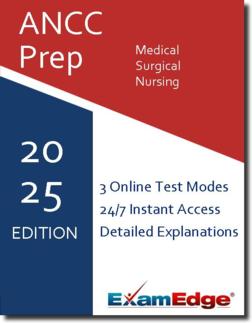ANCC Medical-Surgical Nursing (RN) Practice Tests & Test Prep by Exam Edge - Blogs
Based on 37 Reviews
- Real Exam Simulation: Timed questions and matching content build comfort for your ANCC Medical Surgical Nursing test day.
- Instant, 24/7 Access: Web-based ANCC Medical Surgical Nursing practice exams with no software needed.
- Clear Explanations: Step-by-step answers and explanations for your ANCC exam to strengthen understanding.
- Boosted Confidence: Reduces anxiety and improves test-taking skills to ace your ANCC Medical Surgical Nursing (RN).

Exam Edge Blogs for ANCC Medical Surgical Nursing

Ace Your ANCC Med-Surg Exam: Key Tips & Insights
If you're passionate about medical-surgical nursing, you should take your skills to the next level by getting a certification. Unlike some areas of nu...
Read More
What Score Do You Need for Med-Surg Certification?
Medical-surgical nursing (med-surg) is the most common specialty for registered nurses and is considered the entry-level position for most RNs getting...
Read More
Med-Surg Certification Requirements: Your Complete Guide
If you're aiming for a med-surg certification, there are specific requirements you need to be aware of. The ANCC’s Med-Surg Certification exam cannot ...
Read More
How To Become Med-Surg Certified? A Comprehensive Guide
Medical-surgical nursing is the entry-level point for many nurses—it’s a vital position in every hospital. How do you stand out from the crowd? If you...
Read MoreExam Edge Blogs for ANCC Medical Surgical Nursing

Ace Your ANCC Med-Surg Exam: Key Tips & Insights
If you're passionate about medical-surgical nursing, you should take your skills to the next level by getting a certification. Unlike some areas of nu...
Read More
What Score Do You Need for Med-Surg Certification?
Medical-surgical nursing (med-surg) is the most common specialty for registered nurses and is considered the entry-level position for most RNs getting...
Read More
Med-Surg Certification Requirements: Your Complete Guide
If you're aiming for a med-surg certification, there are specific requirements you need to be aware of. The ANCC’s Med-Surg Certification exam cannot ...
Read More
How To Become Med-Surg Certified? A Comprehensive Guide
Medical-surgical nursing is the entry-level point for many nurses—it’s a vital position in every hospital. How do you stand out from the crowd? If you...
Read More

